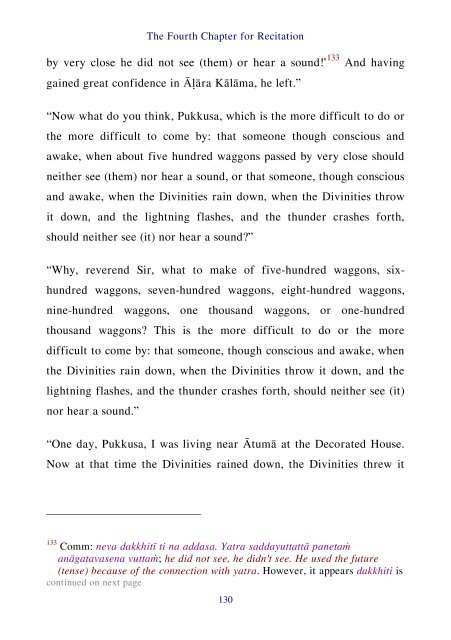The Discourse about the Great Emancipation
An English translation of one of the longest discourses in the canon, detailing the last year of the Buddha’s life, and his final teachings (Mahāparinibbānasuttaṁ, DN 16)
An English translation of one of the longest discourses in the canon, detailing the last year of the Buddha’s life, and his final teachings (Mahāparinibbānasuttaṁ, DN 16)
You also want an ePaper? Increase the reach of your titles
YUMPU automatically turns print PDFs into web optimized ePapers that Google loves.
<strong>The</strong> Fourth Chapter for Recitation<br />
by very close he did not see (<strong>the</strong>m) or hear a sound!’ 133 And having<br />
gained great confidence in Āḷāra Kālāma, he left.”<br />
“Now what do you think, Pukkusa, which is <strong>the</strong> more difficult to do or<br />
<strong>the</strong> more difficult to come by: that someone though conscious and<br />
awake, when <strong>about</strong> five hundred waggons passed by very close should<br />
nei<strong>the</strong>r see (<strong>the</strong>m) nor hear a sound, or that someone, though conscious<br />
and awake, when <strong>the</strong> Divinities rain down, when <strong>the</strong> Divinities throw<br />
it down, and <strong>the</strong> lightning flashes, and <strong>the</strong> thunder crashes forth,<br />
should nei<strong>the</strong>r see (it) nor hear a sound?”<br />
“Why, reverend Sir, what to make of five-hundred waggons, sixhundred<br />
waggons, seven-hundred waggons, eight-hundred waggons,<br />
nine-hundred waggons, one thousand waggons, or one-hundred<br />
thousand waggons? This is <strong>the</strong> more difficult to do or <strong>the</strong> more<br />
difficult to come by: that someone, though conscious and awake, when<br />
<strong>the</strong> Divinities rain down, when <strong>the</strong> Divinities throw it down, and <strong>the</strong><br />
lightning flashes, and <strong>the</strong> thunder crashes forth, should nei<strong>the</strong>r see (it)<br />
nor hear a sound.”<br />
“One day, Pukkusa, I was living near Ātumā at <strong>the</strong> Decorated House.<br />
Now at that time <strong>the</strong> Divinities rained down, <strong>the</strong> Divinities threw it<br />
133 Comm: neva dakkhitī ti na addasa. Yatra saddayuttattā panetaṁ<br />
anāgatavasena vuttaṁ; he did not see, he didn't see. He used <strong>the</strong> future<br />
(tense) because of <strong>the</strong> connection with yatra. However, it appears dakkhiti is<br />
continued on next page<br />
130


















